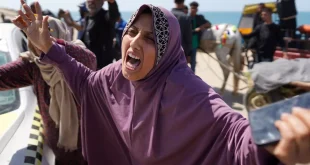The planning of the operation took somewhere between a few months and two years, per different accounts from Hamas leaders. The depth and magnitude of the attack were unprecedented and took Israel by surprise. It was a reaction to changing regional dynamics and growing Israeli aggression.
While Hamas may appear to have fulfilled its declared short-term goals of deterring Israeli violations of Al-Aqsa Mosque and taking hostages to bargain for the release of Palestinian political prisoners held in Israeli jails, it does not appear to have a long-term end game. A heavy-handed response by Israel is ongoing – already claiming more than 950 Palestinian lives – but sooner or later it will have to end with mediation.
Why did Hamas attack now?
Hamas’s move was triggered by three factors. First, the policies of the far-right Israeli government enabling settler violence in the occupied West Bank and Jerusalem led to a sense of desperation among Palestinians and growing demands for a reaction. At the same time, the rising tensions in the West Bank caused by these policies necessitated the shift of Israeli forces away from the south and into the north to guard the settlements. This gave Hamas both a justification and an opportunity to attack.
Second, the Hamas leadership felt compelled to act due to the acceleration of Arab-Israeli normalisation. In recent years, this process further diminished the significance of the Palestinian issue for Arab leaders who became less keen on pressuring Israel on this matter.
If a Saudi-Israeli normalisation deal had been concluded, it would have been a turning point in the Arab-Israeli conflict, which may have eliminated the already weak chances of a two-state solution. This was also part of Hamas’s calculations.
Third, Hamas was emboldened after it managed to repair its ties with Iran. In recent years, the movement had to reconsider the political position it assumed in the wake of the Arab Spring in 2011, in opposition to Iran and its ally, the Syrian regime.
Hezbollah Secretary-General Hassan Nasrallah has said that he was personally involved in improving the relations between Hamas and Damascus. A Hamas delegation visited Damascus in October 2022 and its political bureau chief Ismail Haniyeh travelled to Beirut in April and Tehran in June. Just last month, Nasrallah hosted the Secretary-General of the Palestinian Islamic Jihad Ziad al-Nakhalah and the deputy chief of Hamas’s political bureau Saleh al-Arouri.
Will there be a united front around Hamas?
Iran has denied direct involvement in Hamas’s operation but it has expressed support for it. Islamic Revolutionary Guard Corps general Yahya Rahim Safavi said “we support this operation, and we are sure that the resistance front also supports this issue”.
However, Hamas’s realignment with the “resistance axis” does not necessarily mean there will be a united front on the ground confronting Israel. Hezbollah, for example, has not joined the fight. Currently, domestic politics in Lebanon are not conducive to a conflict with Israel, which is holding the Lebanese group back.
What Hezbollah is trying to do is to deter the Israeli army from going too far in its revenge against Hamas in Gaza, hence it is increasing the pressure on the Lebanese border. Its shelling of Israeli positions is most probably meant to have a psychological effect than a military one. It has also chosen not to overreact in relation to the killing of three of its members by Israeli bombardment.
However, both Israel and Hezbollah are on alert and tensions are high, which means miscalculations can happen.
What is Hamas’s end game?
Three days into Hamas’s surprising and overwhelming attack, it is not clear what its end game is and what it can do to reap long-term benefits. Its priority has seemed to be to take both military and civilian hostages to help deter aggressive Israeli retaliation and later exchange them for Palestinian prisoners in Israeli jails.
However, Israel does not appear to be deterred. Hamas spokesperson Abu Ubaida has said that Israeli bombardment has killed four Israeli citizens held in Gaza. He has also warned that the movement will start killing hostages if Israel strikes civilian homes in Gaza without warning; this might backfire against Hamas if implemented.
The Hamas leadership has said that the objectives of the attacks are ending “Israeli violations”, securing the release of Palestinian prisoners, and “returning to the project of establishing a state”. Hamas may be able to secure a prisoner swap deal with Israel, although, in the past, many of those released from Israeli prisons had been quickly rearrested. But the group does not have a clear roadmap for moving forward on “establishing a state” and it cannot have one separately from the Palestinian Authority in the occupied West Bank.
What is next?
Israel has struggled to recover from the attack. It has intensified its bombardment of the Gaza Strip and announced a total blockade on the coastal enclave, turning off electricity and blocking humanitarian aid. Netanyahu’s government was already facing domestic turmoil before the attack due to its judicial reforms; its stability will now be tested even further.
Israel will have to decide whether to undertake a ground invasion and if it is worth the military and political costs. Whether it proceeds with it or not, sooner or later its military operation, including the excessive bombardment of the strip, will have to come to an end. At that point, Israel will have to ask for Egypt to mediate some kind of conclusion of this escalation and a deal to exchange prisoners.
When the Israeli assault ends, Hamas, which has gained more legitimacy in Gaza and the West Bank with its operation, will also face the challenge of translating it into policies and governance that would serve the Palestinians in the long term.
The United States, for its part, will have to put its normalisation mediation plans on hold for now. US Secretary of State Antony Blinken was expected in Israel and Saudi Arabia later this month to discuss normalisation talks, but his plans have changed and now include a visit to Jordan.
Given the current public mood in the Arab world after the Gaza attack, it would be too complicated to advance talks on a Saudi-Israeli deal. Most probably, these talks will be put on the shelf by the Saudis in the short term but not necessarily fully cancelled.
These developments work in Iran’s favour. With the progress of Arab-Israeli normalisation halted, Tehran can now pressure the US into re-entering a nuclear deal of some kind that would take some of the sanctions pressure off the Iranian economy.
Whatever mediation happens between Israel and Hamas eventually, it is unlikely to address the root causes of the conflict. There does not seem to be any political will within Israel to address issues like the imprisonment of Palestinians, the freezing of Palestinian funds, the dire socioeconomic conditions in Gaza and the occupied West Bank, or the continuing settlement expansion. This means the Palestinian-Israeli conflict will continue to fester and produce cycles of violence.
SOURCE: AL JAZEERA
 Sri lanka Muslims Web Portal Diversity and Inclusiveness
Sri lanka Muslims Web Portal Diversity and Inclusiveness



